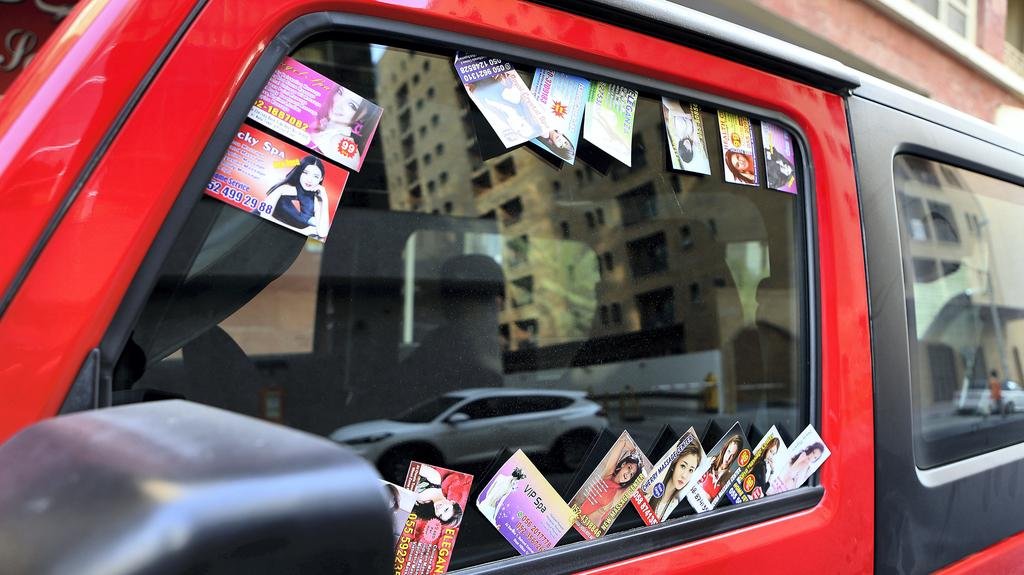The Growing Issue of Massage Cards in Dubai
For years, the streets of Dubai have faced an unusual nuisance—small massage cards scattered across public spaces, tucked into car windshields, and handed out discreetly by individuals working illegally. These cards, often advertising unauthorized massage services, became a symbol of a growing underground network that thrived on the city’s fast-paced lifestyle and massive influx of residents and tourists. What might have appeared to be harmless business cards on the surface were, in reality, tied to organized groups working without licenses and often involving illegal activities.
Residents complained not only about the sheer volume of these cards littering streets and parking areas but also about the deceptive operations behind them. The cards often led unsuspecting individuals to unsafe places, while damaging Dubai’s global reputation for order, safety, and cleanliness.
Why the Crackdown Was Necessary
Dubai has always prided itself on being one of the safest and cleanest cities in the world. For the authorities, allowing the unchecked spread of massage cards meant tolerating a gateway to hidden and unregulated businesses. It was not only a matter of aesthetics or cleanliness—it was about security, law enforcement, and the protection of people.

The networks behind these cards operated in ways that misled customers and often exploited workers. Many individuals brought in under false promises ended up trapped in exploitative conditions. In many cases, the so-called “massage parlors” were nothing more than fronts for illegal activities.
This presented an urgent need for a comprehensive crackdown, not just to sweep cards off the streets but to dismantle the groups behind them.

The Dubai Police Response
Dubai Police launched a wide-reaching campaign targeting the issue from multiple angles. Instead of focusing only on individuals distributing the cards, the force worked strategically to identify and eliminate the source. Surveillance, undercover operations, and public awareness campaigns became part of a larger framework designed to restore order.
Street patrols were increased in key areas where card distribution was most common. At the same time, the police began monitoring suspicious apartments and illegal service providers linked to these cards. By mapping the networks, they were able to dismantle many operations from the top down rather than just removing street-level distributors.

Technology and Smart Policing in Action
Dubai is globally recognized for its use of smart policing methods, and this crackdown was no exception. Authorities used surveillance cameras, AI-powered monitoring systems, and tip-offs from residents to trace and track the operations. The police hotline and smart apps allowed people to report illegal card distribution easily, giving the public a direct role in the cleanup effort.
This integration of technology with community engagement ensured that the crackdown was not a one-time sweep but an ongoing initiative. Each lead and report strengthened the campaign and made it harder for these networks to reestablish themselves.
Impact on the City and Residents
The immediate result of the crackdown was visible on the streets. Areas once littered with colorful cards were suddenly clean, with residents praising the authorities for restoring the city’s image. Car owners no longer had to deal with unwanted cards stuffed under wipers, and tourists began noticing the difference in public spaces.
Beyond the visible change, the crackdown brought a deeper sense of security. People were reassured that law enforcement was actively protecting the city against underground operations that could potentially exploit individuals and tarnish Dubai’s reputation as a safe global hub.
Dismantling Hidden Networks
The most powerful outcome of the campaign was the exposure and dismantling of the networks behind the cards. Many of these groups were operating illegally in rented apartments, often cramming multiple workers into unsafe living conditions. The crackdown not only stopped the distribution of cards but also gave vulnerable individuals a chance to be rescued from exploitation.
By targeting landlords who rented out properties for such purposes and taking firm action against those enabling illegal operations, Dubai Police disrupted the supply chain that kept these services alive. This comprehensive approach ensured long-term results rather than short-lived victories.
The Role of Community Support
The success of the massage card crackdown was not only due to the police but also because of the active role of the community. Residents began reporting incidents more frequently, realizing that their small actions could contribute to a larger solution. Campaigns encouraging people not to engage with such services also helped cut off the demand that fueled the networks.
This cooperation between the police and the public highlighted one of Dubai’s strongest qualities: unity in maintaining order. Together, the authorities and citizens ensured that the city continued to embody its global reputation as a modern, clean, and safe environment.

Sending a Strong Message
The crackdown was not just about cards—it was about sending a strong and lasting message. Dubai will not tolerate illegal networks, deceptive business practices, or anything that undermines the well-being of its residents and visitors.
This campaign reinforced Dubai Police’s reputation as a force that is proactive, technologically advanced, and deeply committed to protecting the city. It also reminded illegal operators that even the smallest signs of misconduct, like a simple business card, will not go unnoticed.
Looking Ahead
While the crackdown was highly effective, the authorities remain aware that illegal activities often adapt and re-emerge in new forms. That is why Dubai Police continue to monitor suspicious activities and encourage residents to remain vigilant. The crackdown served as a reminder that order is not maintained by chance—it requires constant effort, innovation, and collaboration between the community and law enforcement.
Dubai’s approach has now become a model for other cities facing similar issues. By addressing the problem at its root rather than just treating the symptoms, Dubai Police demonstrated how a city can balance rapid growth, cultural diversity, and security without compromising on values.
The Bigger Picture of Safety in Dubai
The massage card crackdown is only one chapter in Dubai’s broader commitment to safety and order. The city invests heavily in maintaining its status as a global hub where people can live, work, and visit with peace of mind. From cybercrime units to specialized patrols, every aspect of law enforcement in Dubai is designed to ensure that security keeps pace with the city’s growth.
The removal of massage cards is symbolic of something much larger—the determination to preserve Dubai’s global image, protect its residents, and create a city where even small nuisances are addressed with efficiency and care.
Conclusion
Dubai Police’s crackdown on massage cards was more than a campaign to remove litter from the streets. It was a comprehensive, strategic, and human-centered approach to dismantle illegal networks, protect vulnerable individuals, and restore the city’s image.
What makes this initiative remarkable is how it combined technology, community involvement, and strong law enforcement to achieve lasting results. For the people of Dubai, it served as reassurance that the city they call home continues to be protected with vigilance and care.
For the world, it was another reminder of why Dubai stands out—not just as a city of opportunity and innovation but also as a place where safety and integrity are never compromised.
Do follow UAE Stories on Instagram
Sustainability Initiatives in Dubai Homes You’ll Want to Embrace















